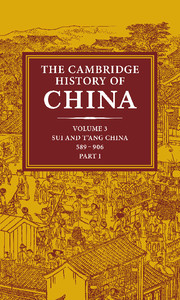Book contents
- Frontmatter
- 1 Introduction
- 2 The Sui dynasty (581–617)
- 3 The founding of the T'ang dynasty: Kao-tsu (reign 618–26)
- 4 T'ai-tsung (reign 626–49) the consolidator
- 5 Kao-tsung (reign 649–83) and the empress Wu: the inheritor and the usurper
- 6 The reigns of the empress Wu, Chung-tsung and Jui-tsung (684–712)
- 7 Hsüan-tsung (reign 712–56)
- 8 Court and province in mid- and late T'ang
- 9 Court politics in late T'ang times
- 10 The end of the T'ang
- Glossary Index
- References
9 - Court politics in late T'ang times
Published online by Cambridge University Press: 28 March 2008
- Frontmatter
- 1 Introduction
- 2 The Sui dynasty (581–617)
- 3 The founding of the T'ang dynasty: Kao-tsu (reign 618–26)
- 4 T'ai-tsung (reign 626–49) the consolidator
- 5 Kao-tsung (reign 649–83) and the empress Wu: the inheritor and the usurper
- 6 The reigns of the empress Wu, Chung-tsung and Jui-tsung (684–712)
- 7 Hsüan-tsung (reign 712–56)
- 8 Court and province in mid- and late T'ang
- 9 Court politics in late T'ang times
- 10 The end of the T'ang
- Glossary Index
- References
Summary
The sources for eighth and ninth century Chinese history, most of which have been described in the scholarly literature, far outnumber those for earlier periods, and so we can readily imagine what the general quality of life in late T'ang Ch'ang-an must have been. Moreover, the subject of this essay, high politics from 75 5 to about 860, is probably better represented among the documents and in the histories than any other topic. Nevertheless, to the particular frustration of the political historian, there are some basic questions about the late T'ang court that we may never be able to answer satisfactorily owing to the lack of sufficient reliable data. This is not merely a matter of details, or of refinement of interpretation, for the quantity and quality of ninth-century data represent a severe constraint. We must therefore subject the extant Chinese records to the most pains-taking scrutiny, so that their preconceptions and omissions will mislead us as little as possible. That procedure is not unusual in itself, of course, but for some late T'ang topics (such as ninth-century political factionalism, which has suffered from a thousand years of biased interpretation), the lack of substantial new evidence makes it difficult to do more, in honesty, than unravel inherited distortions. Occasionally we can glean bits of information on such difficult questions from the general collections of T'ang poetry and prose, but it should come as no surprise that corroborative material about events which took place so long ago frequently proves thin, or untrustworthy.
- Type
- Chapter
- Information
- The Cambridge History of China , pp. 561 - 681Publisher: Cambridge University PressPrint publication year: 1979
References
- 5
- Cited by

